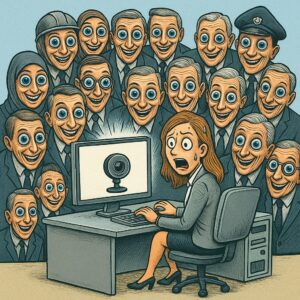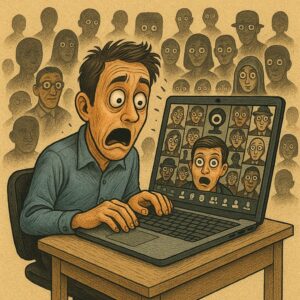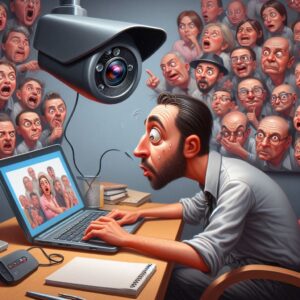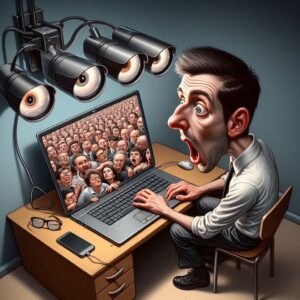PCの向こうで誰かが見ているとは?
この風刺画について
この風刺画「PCの向こうで誰かが見ている」は、現代社会におけるプライバシーの危機と、デジタル監視の常態化に対する問題提起としてAIで描きました。
私たちは日々、スマートフォンやパソコンを通じて膨大な情報を発信していますが、その一方で、私たち自身がどこで、誰に、どのように「見られている」のかを自覚する機会は少ないのではないでしょうか。
この作品では、そんな「見えない監視の視線」を、視覚的に強調した表現で可視化しています。
TOPの風刺画は3つに分かれています。
左の風刺画では、ノートパソコンの画面の向こうに無数の目が並び、使用者の男性が驚きの表情を浮かべています。
これは、日常のビデオ会議やSNS投稿、検索履歴などが、実は多くの第三者に監視されているという事実を示しています。
中央の女性の風刺画では、監視カメラのレンズが人の顔になってこちらを見つめており、彼女が恐怖に怯える様子を描いています。
そして右の風刺画では、画面の向こう側に大量のスーツ姿の人々が笑顔でこちらを凝視しており、彼らが企業や政府の象徴であることを暗示しています。
このように、単なる技術の利便性の裏にある「見られる恐怖」や「同意なき監視社会」の姿を、極端かつ風刺的に描いたのが本作品の狙いです。
笑って見るだけで終わらせず、一歩踏み込んで「自分は本当に守られているのか?」と考えるきっかけになればと願っています。
風刺画のポイント
この作品を描く際に特に意識したのは、デジタル時代における「見えない不安」を、視覚的にわかりやすく、かつ強烈に伝えることでした。
画面の向こうにいるはずの人たちが、こちらを凝視しているという構図は、実際の監視システムやアルゴリズムが常にユーザーの行動を追跡・記録している現実を表現しています。
例えば、中央の風刺画では、監視カメラのレンズから人の顔が覗いています。
これは、無機質な機械に魂が宿っているような不気味さを演出することで、「ただのカメラではない」というメッセージを込めました。
また、女性が顔を手で覆っているポーズには、「もう見ないでほしい」という無言の抵抗の意志を込めています。
右側の風刺画では、スーツ姿の集団が満面の笑顔で女性を監視している構図になっています。
これは一見コミカルに見えますが、その実、「企業がユーザーのデータを覗き見ている様子」を皮肉ったものです。
笑顔であるがゆえに不気味さが際立ち、日常的に行われている監視の恐ろしさがより際立つよう工夫しました。
さらに左の風刺画では、PCの画面に「自分の顔が映っている」ことに驚いている男性を描いています。
これは、ビデオ会議やSNS、リモートワーク中に「自分がどこまで覗かれているのか分からない」という不安を象徴しています。
背景に描かれている無数の影は、「見えない観察者」や「データ収集者」の象徴です。
私はこの作品を通して、視聴者に「当たり前に思っているデジタル生活の裏側」に目を向けてほしいと願っています。
プライバシーという言葉が薄れつつある現代において、「何を守るべきか」「何を知るべきか」を考えるきっかけとして、この風刺画が機能することを願って描きました。
AIが描いた「PCの向こうで誰かが見ている」
 |
 |
 |
 |
 |

コメント